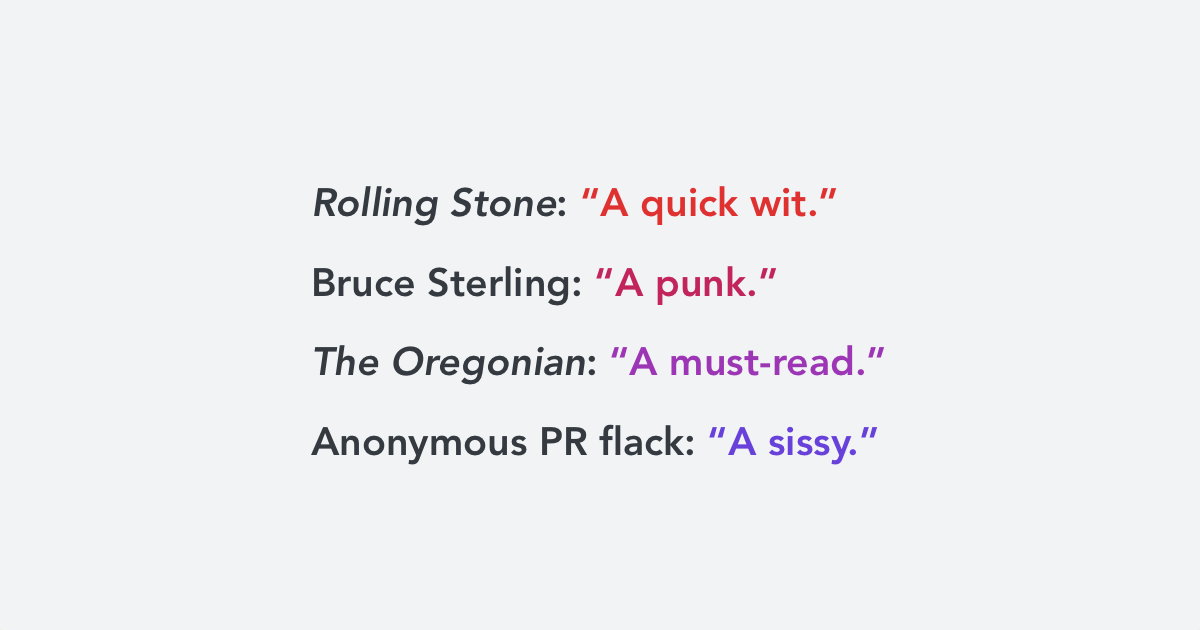Some folks have gotten themselves together as something they’re calling the Social Web Foundation, and I’ll cut to the chase: this is an attempt by ActivityPub partisans to rebrand the confusing “fediverse” terminology, and in the process, regardless of intent, shit on everything else that’s been the social web going back twenty-five years.
Oh no! Somebody organized to further the interests of the free and open internet, and they didn’t invite me even though I was active on some IRC channel in 1995!
Cry me a fucking river.
This Bix guy seems a bit butthurt.
Like, I am sure there are dozens of definitions for what “social web” is and when it began. And that sentence about Evan surely is sus, but is one sentence on one foundations website. I’m still thinking that this foundation will be pretty irrelevant.
By the same token Evan seems a bit self centred and egotistical about his projects. Of you look at his comments about BlueSky it seems he’s pretty bitter that someone dared to make an alternative protocol that so far has a decent amount of users, when a acceptance of multiple systems experimenting and borrowing from each other for the good of the open web is right there as a natural position.
Given how other impactful contributors to the ActivityPub spec have been presenting their work in public vs how Evan does it, one can certainly get the impression that he is a bit self centered, yeah.
deleted by creator
(1/?)
@skullgiver
> However, the Fediverse was never just about ActivityPubCorrect. As those of us who used GNU social 10 years ago will never tire of telling you, it was coined to describe the OStatus network. Once all the software using OS adopted ActivityPub, it came to describe the AP network, and anything hanging directly off it (eg Diaspora).
> ATProto is part of the Fediverse too
No it isn’t, because…
> Fediverse software doesn’t speak it.
Same with XMPP, Matrix, etc
As I’ve only just recently written here, blog comments are not social media, and I think such things should remain separate.
So it’s definitely not social media but it is the social web? I don’t see any comments section at all over there. Some of these “indieweb” guys are pretty weird.

Technically the blog author is right. Sure, the social aspects of the web go back to the very first chat rooms, but okay. Let’s set a backstop at web 2.0’s blogs. So what is his point, let’s burn down this new foundation on a technicality before it gets off the ground?
Also technically, “social web” is super imprecise when clearly the organisation is supposed to promote and highlight federated platforms. Sounds like somebody did a super lazy brainstorm without looking up from their belly button to consider this exact fallout.
I have the feeling the same somebody will be on the market for a new domain name pretty soon.
There’s quite a few people who think the social web is a good term for what this is; websites talking to each other, allowing for two-way communication across platforms.
Not everybody loves the word “Fediverse”. And then for those who like it, the connotations might be somewhat different.
You can’t really do anything right in this field, as there are thousands of people ready to cry their hearts out at any given decision. But calling communication between web platforms the social web is not extremely controversial, and it’s a bit easier to sell to a wider audience (government agencies, media outlets, people who don’t know what HTML is) than going on an on about some obscure Fediverse. Different uses.
You can’t really do anything right in this field
I agree with a lot of your points, but this is probably the objectively truest one 🙂
What’s a better protocol for a social web?
His point is there is no one protocol for the social web. The (open) social web is built on a pluriverse of protocols, like rss, email, irc, matrix, activitypub, atproto…
Applause for the term “pluriverse” (did you coin it?).
And a standing ovation for the alliterative phrase “pluriverse of protocols”.
I was the first person to post on the pluriverse in 2008.
I was there 👆🏼
At age 6, I was born without a face.
I don’t get that from the article. And I mean it’s not a “web” if it’s not interconnected, is it?
Things have shifted a bit in the last many years. Now almost no one reads blogs anymore. They want doom-scrolling and interaction. And even the old school nerds moved away from RSS, Mail and IRC. I also liked some Linux forums, but I feel it got more quiet there during the last years. Mostly to the benefit of proprietary platforms like Discord and such. But I don’t thing they’re very social, as in open and giving freedom to the people…
maybe OcapPub ?
Thank you for this. Written by one of the AP designers to address privacy and security elegantly and natively. It is the best option for the future of networking and gets nowhere near enough adoption, funding, and developer resources.
tcp
hate the player, not the game
Interesting to see those kind of things happen, hopefully it’s only a first one.
Blogs were the social web. Friendster was the social web. MySpace was the social web. Twitter was the social web.
With the possible exception of blogs, these are all walled gardens. I’m not disputing the statement, but we now know these are bad places to grow the Social Web.
(I say possible exception because, while with blogs you can self-host and if you don’t want to do that, there are multiple options to choose from, you can still get caught in the trap of trusting one provider and losing everything/getting locked out. Thinking about Posterous here.)
So if not the start date, 2008 is still an important milestone - it’s when we started cutting the cord from these walled gardens to grow an independent web.
Who cares
it’s better than “threadiverse” which at once includes the name of a Facebook product and seems to also give Facebook all the credit for mastodon, Lemmy, pixelfed, peer tube be etc, while also making them appear to be second class citizens.
but I am not endorsing this “social web” thing yet, either.













